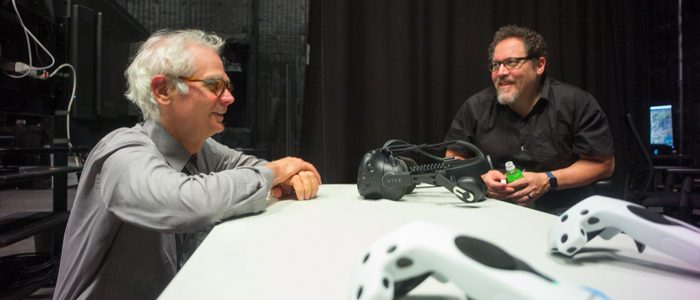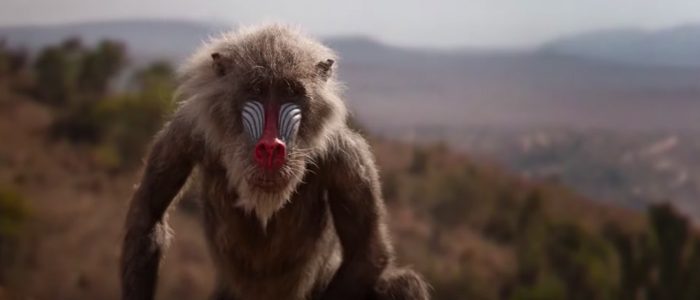
In December 2017, I drove to Playa Vista, California to visit the set of Disney’s The Lion King. Our full set visit report is still under embargo for now, but we are allowed to publish our conversation with director Jon Favreau, who joined our small group of journalists for an extended interview.
Much of the set visit was spent discussing the technical aspects of how the film was coming together, but this talk with Favreau is a bit more personal. He explained why he wanted to make this movie (despite the fact that the animated original “still holds up really, really well”), what speaks to him about this story, crafting the tone of the movie, how different this is from the animated version, this film’s music, and why he cast Donald Glover and Beyonce in the lead roles. Read the highlights of our Jon Favreau interview below.
Naturalism, And Favreau’s Reason For Making This Movie
Much of the work of filming The Lion King was done in virtual reality, with Favreau and collaborators like cinematographer Caleb Deschanel donning headsets, scouting digital locations for the perfect shot, and filming scenes with loosely rendered animated characters in the virtual world before sending them off to be finalized by the visual effects vendors. (We’ll detail exactly how that process works in our full set visit piece, so keep an eye out for that.) Favreau, who comes from a traditional filmmaking background, spent much of the shoot chasing moments that felt natural and almost accidental, as opposed to shots that were perfectly crafted.
“What we’re trying to do is, just like motion capture tries to get anomalies of performance, what we’re trying to get is anomalies of photography,” he said. “So if Caleb is communicating to someone operating a crane or a dolly, there’s going to be a little bit of an interplay, almost like musicians working together, where the dolly might move too fast, or faster in one take. So we have to back pan a little bit, or a happy accident happens. And all those little subtleties actually – it’s not anything I think anyone would notice consciously, but between the quality of the rendering and the techniques we’re using, it starts to hopefully feel like you’re watching something that’s not a visual effects production, but something where you’re just looking into a world that’s very realistic and emotionally feels as realistic as if you’re watching live creatures.
“And that’s kind of the trick here, because I don’t think anybody wants to see another animated Lion King, because it still holds up really, really well. But what gave me some encouragement was the work we were able to do on Jungle Book. I saw it as a great opportunity to springboard, refine the tools, and do this process for this. But also, seeing the animated film and then seeing the stage production as being able to exist with very close storylines and with much of the same music, and of course different people playing the characters in the different medium, but they’re not seen as redundant. People will go see the stage show, and they’ll also see the movie, and you could love both of them and see them as two different things. The challenge here, and I think what we laid out for ourselves as a goal, is to create something that feels like a completely different medium than either of those two, and so it could stand as yet a third way of telling this story. And fortunately, the music’s really emotional and strong and wonderful, and we have great singers here to reinterpret those songs, so that helps freshen it up a bit.
“And also, using these techniques and really making the visual effects department a creative partner from the inception allows us to present visual effects, I think, hopefully, in a way that you haven’t seen it before. So, just the spectacle of it, of if we can present something that looks like a BBC documentary on top of telling the story, and having those two exist together. The little bits that we’ve seen of it feels really encouraging and exciting and fun, and it’s nice to, whatever it is, twenty years later, tell a story that still feels very relevant and music that really holds up to a new generation and introduce kids to it. And take full advantage of what’s available on the big screen and make a case for people to actually go to the movie theater. That’s something else I think that wasn’t part of the equation when I started in movies. But now you’ve got to convince people that they shouldn’t sit home and watch the great television that’s on, or the show they want to binge. It’s like having a restaurant: if you’ve got good food at home, you better make [going out] an event.”
What Speaks To Him About This Story
Though it has moments of humor and fun, The Lion King is not an overly joyous movie. It’s complicated, with a mixture of light and darkness, and that balance is what attracted Favreau to telling this story in this medium.
“I want to highlight really what’s in there from the original,” he explained. “It’s the whole circle of life. Bad things happen, good things happen. Not every scene in the movie is fun to watch. There’s tragedy in it. But ultimately what I like about it is that somehow after that whole experience, you walk away feeling inspired and hopeful. Which is how I like my stories. Everybody’s different – it depends where you put the comma. If you end after Mufasa dies, different movie. (laughs) But as I go through dialogue – and especially hearing James Earl Jones say the lines, because he is the one character that is in both films, ours and the old one – it’s moving. It still gets me. And the music also has a lot of soulfulness in it. As we do the music, as the stage play did, we’re really exploring further what the roots of the music are. And because there’s just such a tremendous emotional power and spiritual impact to hearing the choir sing and there’s something that feels very ancient and powerful to it. And that Hans [Zimmer] and Elton John and the whole team somehow tapped into this wonderful thing that when you hear it…Part of it, when we did that teaser [at the D23 Expo in 2017], it was like, as long as you have the sun coming up and you hear those first notes, I’m already leaning forward. And then we just have to make sure that everything we show either references the old film – memories for people who saw it and just cool images for people who never saw it.”

Is This Film Animation or Live-Action?
One of the most jaw-dropping aspects of our set visit included a quick trip to a screening room, where they showed us a simple test shot of Rafiki, one of the movie’s supporting characters, just sitting and looking at the camera. He didn’t speak – he just breathed, blinked, and moved around a bit – but it was completely mesmerizing and totally indistinguishable from an actual nature documentary. The uncanny valley may not have been traversed when it comes to generating convincing humans on screen (cough, Grand Moff Tarkin, cough) but this test footage proved that the gap has been closed when it comes to creating believable, lifelike animals on screen.
When Favreau directed The Jungle Book in 2016, it was easy for media outlets to refer to it as “the live-action Jungle Book” because he did actually shoot live-action footage of actor Neel Sethi as Mowgli and incorporated that into digital environments. But this version of The Lion King doesn’t have any live-action footage at all, so how should it be categorized? Even Favreau himself doesn’t know the answer to that question.
“Well, it’s difficult because it’s neither, really. It depends what standard you’re using. Because there’s no real animals and there’s no real cameras and there’s not even any performance that’s being captured that’s underlying data that’s real. Everything is coming through the hands of artists. But to say it’s animated I think is misleading as far as what the expectations might be. And it also changes the way you sit and watch it. Because hopefully, you could just watch it without it being introduced. If we put up that Rafiki footage and didn’t say what it was, some people might know, some people might not know how it was done, but it causes you to be present and mindful and pay attention because you’re trying to figure out what you’re looking at. And that’s a great disposition to be in as an audience member.
“I remember when I saw Gravity, I didn’t know what I was gonna expect, I just heard it was cool. I didn’t know how they did half the tricks. And I was completely drawn in by it and it was the experience I remember going to the movies for when I was little. It just washes over you. I think calling it live-action is also not appropriate either, because it sounds like we’re trying to present something that isn’t accurate. And I don’t know what we’re gonna call it. I don’t know. But remember, things have to sort of fit into one clickable headline, so it’s hard to have the nuance.”
Continue Reading The Lion King >>
The post ‘The Lion King’ Director Jon Favreau on Giving His Version a Documentary Feel, the Challenges of Expectations, and Much More [Set Visit Interview] appeared first on /Film.
from RSSMix.com Mix ID 8320810 http://bit.ly/2KeoxQL
No comments:
Post a Comment